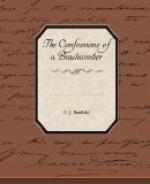exhilarating beverage realise the amount of labour
and care involved before the crop is taken off and
preserved from deterioration and decay? A few
berries that may have become mildewed during the slow,
tedious and anxious process of drying in the sun,
may violate the delicate flavour and aroma which the
grower has been at pains to secure and fix. In
coffee it is as with many other features of rural
life in Australia. The men who undertake the
production are for the most part those who have gained
their knowledge by personal experience on the spot.
Reading and the advice of experts who have graduated
in countries where climatic conditions are diverse
and where the labour is cheap, yet skilled by reason
of generation after generation of occupation in it,
do not complete necessary knowledge. Problems
have to be faced that have no theoretical nor official
solution, and blunders paid for, until by the process
of the elimination of mistakes the right way is discovered.
Losses mount up until either patience and means are
exhausted, or success crowns the application of intelligent
enterprise. Then, when the coffee planter, self-taught,
in each and all of the departments of culture and
preparation, glories in the assurance of his capabilities
to offer to the world an article of indubitable character,
he discovers that the vulgar world, for the most part,
prefers its coffee duly adulterated; indeed has become
so warped and perverted in perception that the pure
and undefiled article is looked upon with suspicion
and distaste. Its flavour and aroma are quite
foreign to the ordinary coffee drinker. The contaminated
beverage is regarded as pure, and the genuine article
is soundly condemned as an imposition, and the seller
of it is liable to be accused of fraud. It is
in a similar position to the good grape brandy which
Victorians produce, and which drinkers of some imported
stuff (described as one part cognac and three parts
silent spirit) fail to recognise as real brandy.
If coffee is not muddy and thick and does not possess
a mawkish twang of liquorice, it is suspected.
The delicate aromatic flavour, the fragrant odour,
the genial and stimulant effects are now almost unknown,
except in limited circles. North Queensland is
capable of growing far more than sufficient coffee
for the Commonwealth, but coffee is not a popular
Australian beverage, and as it entirely loses its
specific balsam and identity under the manipulation
of manufacturers, it cannot get the chance of becoming
popular. Australian wines, Australian spirits
and Australian coffee might well be the popular beverages
of Australians. But preference is given to foreign
importations, of the genuineness of some of which
there are strong grounds for suspicion; or in the
case of coffee its elements are so disguised by adulteration
that a revolution in public taste must take place
before it can possibly find general favour.




